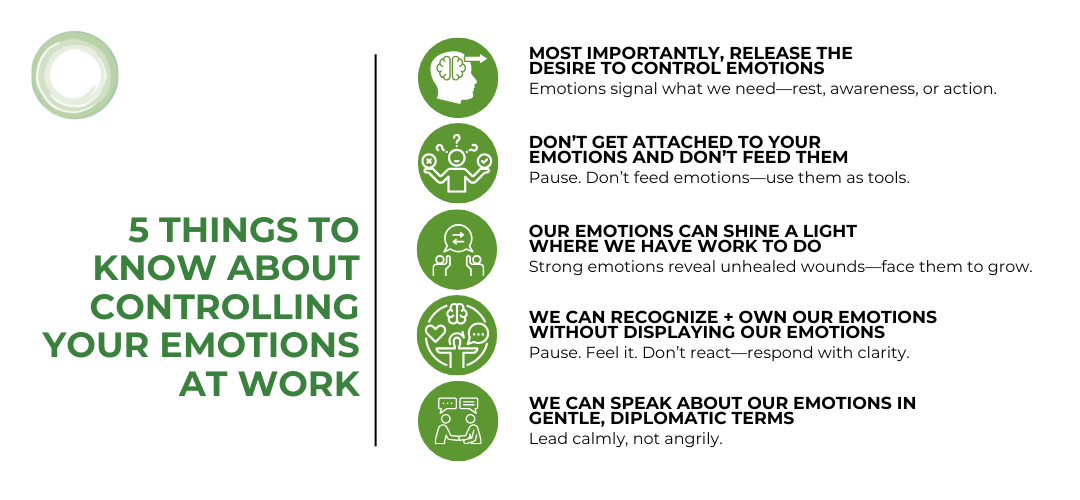“Susan, do you teach people how to control their emotions at work? Because if you do, can I hire you to teach my boss?”
My friend is half-joking when she asks me this. We’re on vacation, two hours into a strenuous hike, and she’s been telling me about her hotheaded boss for the last mile.
We keep hiking up the mountain, ducking under branches and scrambling over boulders, and she recounts all the times her boss has lost his cool. The time he pushed a chair to the floor. His go-to sarcasm. The specific vein in his neck that starts throbbing when he’s about to yell.
Struggling with emotionally reactive leaders on your team? Our Leadership EDGE coaching helps leaders build calm, influence, and emotional agility.
Unsurprisingly, his lack of emotional control is chipping away at company morale. Employee turnover rate is increasing. People are afraid to tell him “no” and bad ideas are being executed because no one wants to get yelled at.
I wish I could say this was the first time I’ve heard stories like these. It’s not. But when I tell my friend how I feel about emotions and the workplace, she’s surprised.
5 Things to Know About Controlling Your Emotions at Work
1. Most importantly, release the desire to control emotions
Our emotions are an important tool in the work we do. They’re our bodies’ way of telling us critical information: we’re working too hard or not sleeping enough. They give us insight into things that we might not want to acknowledge—hunches we should look into, or pain points we’ve been avoiding.
2. Don’t get attached to your emotions and don’t feed them
When we’re angry or frustrated or hurt, it’s easy to lean into those emotions, settling into them like an overstuffed recliner. It’s easy to revisit them and even feed them, thinking self-righteously about how a client wronged us or how a team member dropped the ball.
Who among us hasn’t replayed a scenario in our minds over and over, each time coming up with a more scathing response—and driving our blood pressure up each time we think about it?
Or maybe we allow one experience or one set of emotions to trigger a downward spiral. When a client is late with a payment, we start thinking about every negative client interaction we’ve had over the course of our careers, winding ourselves up with each unpleasant memory.
Stop. This is not a beast we need to feed. When we can step back from our emotions and resist the urge to amp them up, we can learn from them and use them as the tools they are.
Leaders who can pause and reflect under pressure inspire trust. Learn the tools to respond—not react—in our executive coaching programs
3. Our emotions can shine a light where we have work to do
I’m very confident in the leadership 360 framework I use (The Leadership Circle). If someone challenges me about it, it’s unlikely that I’ll have an emotional response. I’ll probably think “Hmmm, I guess they have a different perspective,” and get curious about what that is.
But if my immediate emotional response is anger, insecurity, or arrogance, I’ve just discovered a soft spot. Maybe a soft spot I wasn’t previously aware of.
As unpleasant as it can be to experience these negative feelings, we can choose to shift the way we interpret them. We can choose to treat these emotions as the learning tools they are, pointing us towards our opportunities for growth. If you are feeling a strong reaction, chances are it’s shining the spotlight on additional inner work you need to do. It probably has little to do with the circumstance at hand, but instead is triggering an old wound that never healed from your past. And what I’ve seen is that it’s going to keep reappearing in your life—until you deal with the trigger once and for all.
4. We can recognize + own our emotions without displaying our emotions
Let’s say one of your team members drops the ball on a big project, resulting in missed deadlines and unhappy clients. Understandably, you might feel quite angry about this.
You have two choices.
1. You can storm into your team member’s office, face red and voice raised. You can yell and name-call and hear your heart ringing in your ears.
2. Or you can simply notice the adrenaline and the spike in your blood pressure. You can say to yourself “Wow, I’m really angry that this project got screwed up. I’m really upset that we have to push back the deadline again and that our clients are going to be disappointed…” Then, after you’ve recognized and owned your emotions, you can more calmly share with your colleague your disappointment and engage in a conversation to find creative ways to rectify the situation, or make future agreements about how the work is handled. Practicing emotional intelligence also means creating space for honest feedback from your team.
It takes practice, but it’s possible to recognize and own our emotions without emoting them to everyone in the office.
5. We can speak about our emotions in gentle, diplomatic terms
When our emotions are triggered, the knee-jerk reaction is often to speak in pretty blunt terms. It’s easy to say “You frustrated everyone on the board with that stunt you pulled” or “You really screwed that up!”
As tempting as it is to speak that directly, it doesn’t do much to increase morale. Shame doesn’t do much for motivation.
Instead, take as much time as necessary to collect yourself and try something more diplomatic. Try something like “Friday was a pretty frustrating day. The team was really impacted in the following ways. How can we avoid something like that in the future?” or “The team was pretty disappointed about missing that deadline and has some deep concerns about upcoming projects. Let’s talk about how we can meet future deadlines.”
Some might say: “But Susan, if I don’t show my anger, my team won’t get how important this is!” Not so. If you have ever watched The Dog Whisper, one of Cesar Millan’s main tenants, is to correct your dog with calm, assertive energy. Believe it or not, we are energetic beings and you need to bring the same perspective to addressing disappointments with your team, as their leader.
Want your leadership team to lead with emotional intelligence and presence? Book a demo to explore training options tailored for your organization.
Undoubtedly, these sorts of calm responses take a bit more time and effort than their hotheaded, blunt counterparts. But that time is well spent. Keeping your cool, while still being honest about your emotions, will lead to better relationships, higher morale, and better teams.
As a leader, you don’t have the luxury of chair-throwing antics. Keeping employees engaged and empowered through managing your own disappointment is the heart of leadership.

Need help productively managing your emotions or dealing with highly charged colleagues? Help is a click away.


